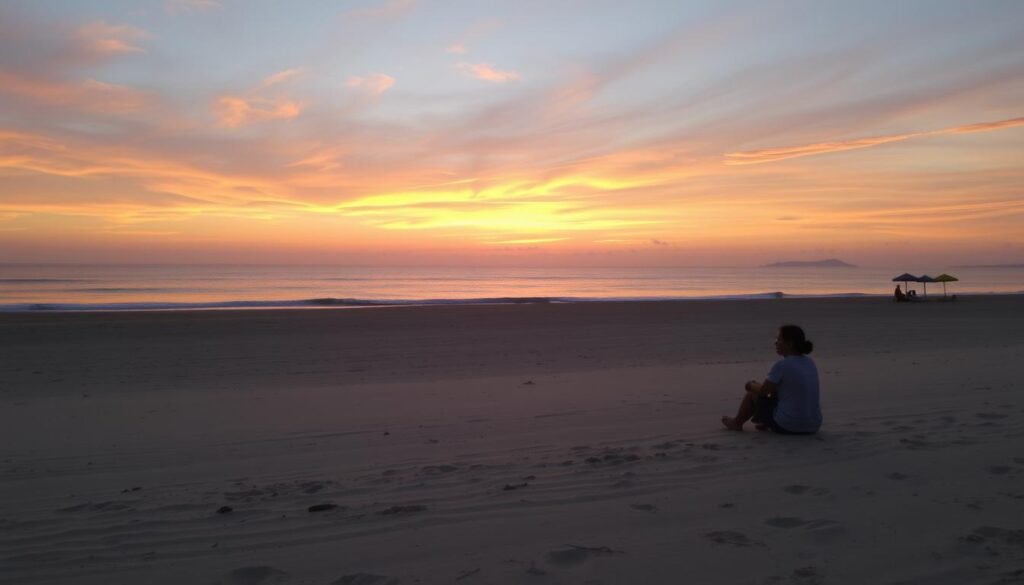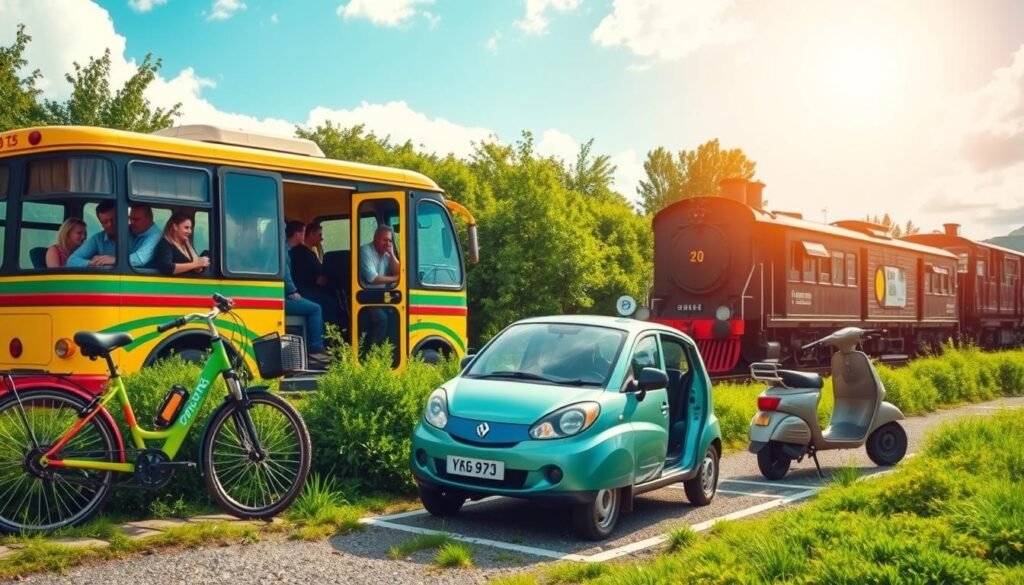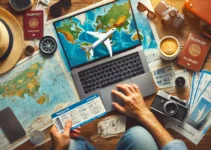I’ve been answering questions about budget travel for 14 years now. The top concern I hear? Money. But let me tell you a secret: you don’t need to be rich to see the world. There are many ways to enjoy affordable vacations without spending a lot.
From cheap travel hacks to frugal travel tips, I’ve got you covered. Whether it’s finding budget-friendly places to stay or using rewards points, there’s always a way to make your travel dreams come true. Let’s explore some smart strategies that’ll help you explore more while spending less.
Key Takeaways
- Plan early for best deals on flights and accommodations
- Consider alternative lodging options like hostels or Couchsurfing
- Travel during off-peak seasons for lower costs
- Use reward points to save on flights and hotels
- Explore work opportunities abroad to fund your travels
- Take advantage of free activities and local transportation
- Utilize the sharing economy for cheaper travel options
Plan Early and Smart for Budget-Friendly Travel
Planning ahead is key to traveling on a budget. Start looking for deals on flights and hotels months early. This has saved me a lot of money over the years.
Start Planning Months in Advance
It’s important to plan early. I start checking out places and costs six months before I go. This lets me compare prices and find the best deals.
Use Price Tracking Tools
Tools that track prices are super helpful for planning. I use Google Flights to watch for price changes and set alerts. This helps me catch great deals.
Book at Optimal Times
Booking at the right time can save you money. I’ve noticed that booking flights on Sundays often gets me the best prices. Traveling during the week, especially on Tuesdays, is also cheaper.
| Currency | Exchange Rate (USD) |
|---|---|
| Thai Baht | 36.81 |
| Argentine Pesos | 893.71 |
| Guatemalan Quetzales | 7.77 |
| Hungarian Forints | 359.07 |
Knowing how currencies compare can help your budget. For instance, places like Thailand or Argentina offer good value for the US dollar. This means your money goes further.
By using these tips, I’ve cut my travel costs a lot. Remember, planning well is the first step to a budget-friendly and fun trip.
Choose Budget-Friendly Accommodations
Finding affordable places to stay is key to sticking to your travel budget. I’ve traveled over 35 countries on a tight budget and have some great tips for finding budget-friendly accommodations.
Opt for hostels and shared rooms
Hostels are a must for travelers on a budget. I’ve stayed in many dormitory-style rooms and met other adventurers. They’re a great way to save money and make new friends. Plus, many hostels also offer private rooms for those who want more privacy without spending a lot.
Explore Airbnb and Couchsurfing options
Airbnb can really help you save money while traveling. I once found a cozy apartment in Vietnam for less than $7 a night! Couchsurfing is even better – it’s free and lets you connect with locals. Through Couchsurfing, I’ve made friends all over the world.
Consider staying with friends or family
Reaching out to your network can lead to free stays and insider tips. I’ve stayed with friends and family in many places, saving money and getting to experience life like a local.
| Accommodation Type | Avg. Cost per Night | Social Factor |
|---|---|---|
| Hostel Dorm | $10-$30 | High |
| Airbnb Private Room | $20-$50 | Medium |
| Couchsurfing | Free | Very High |
| Friends/Family | Free | High |
Traveling on a budget isn’t just about saving money. It’s about having amazing experiences. Whether you’re in a busy hostel or a local’s home, these choices can make your trip unforgettable.
Maximize Rewards and Travel Points

Using travel rewards, credit card points, and airline miles can really help cut down on travel costs. With 65% of U.S. adults skipping summer vacations due to budget issues, it’s key to make the most of these programs. Let’s dive into how to do that.
Credit card sign-up bonuses are a treasure trove for budget travelers. Many cards offer welcome bonuses of 50,000 to 100,000+ points. For example, the World of Hyatt Credit Card gives up to 60,000 bonus points. These points can lead to big savings.
Airline miles are another great way to save money. A round-trip economy-class ticket to Europe usually costs between 30,000 and 60,000 miles. This is much cheaper than cash fares, which can start at $400 during off-peak seasons. For those who prefer luxury, business-class tickets to Europe need 80,000 to 140,000 points, saving you about $5,000 in cash fares.
Hotel rewards programs also offer great value. Hyatt’s all-inclusive hotels start at just 12,000 points per night during off-peak seasons. Marriott Bonvoy points, worth an average of 2.3 cents each, can lead to big savings on where you stay.
“Using credit cards that earn travel rewards for all purchases is advised to maximize miles and points earnings.”
Here are some tips to make the most of these programs:
- Choose cards that fit your travel style
- Use your card for daily expenses to earn points faster
- Look for cards with bonus categories that match your spending
- Take advantage of transfer partners to increase point value
By following these tips, you can join the 23% of American consumers who use points to offset rising travel costs. Remember, finding cheap flights is just one part of budget travel. Using travel rewards smartly can make your dream vacation a reality.
| Reward Program | Key Benefit | Point Value |
|---|---|---|
| Alaska Airlines Mileage Plan | Best Airline Loyalty Program 2024 | Varies by redemption |
| World of Hyatt | Best Hotel Rewards Program 2024 | 12,000 points for all-inclusive stay |
| Marriott Bonvoy | Large hotel network | 2.3 cents per point average |
| Chase Ultimate Rewards | Flexible redemption options | Varies by transfer partner |
Travel During Off-Peak Seasons
Off-peak travel is a great way for budget-conscious adventurers to save money. By planning your trips during the shoulder season, you can cut costs and have a better time. Let’s explore how to travel during the off-peak and find those amazing low season deals.
Peak vs. Off-Peak: Timing is Everything
Knowing the difference between peak and off-peak travel is key. In the U.S., off-peak months are from September to March. During these months, you can save 25% to 50% on average compared to peak season prices. It’s not just about saving money; it’s about making the most of your trip.

Price Comparison Across Seasons
Comparing prices across seasons can lead to big savings. In the shoulder season, you’ll find discounts on lodging, including free meals and attraction tickets. Airlines also offer lower mileage requirements for flights, making your points go further.
Benefits Beyond Your Wallet
Off-peak travel isn’t just about saving money. You’ll enjoy fewer crowds, shorter lines, and more activity options. Imagine visiting famous places like Angkor Wat or Petra without the crowds. Stores also offer lower prices to draw in customers, giving you more value for your money.
I visited Paris in November and felt like I had the city to myself. The Louvre was peaceful, and I snagged amazing deals on hotels!
While off-peak travel has many benefits, remember to think about the weather and school schedules if you’re traveling with kids. With some planning, you can enjoy the low season deals and have memorable trips without spending a lot.
How to Travel on a Budget: Transportation Tips
Smart travelers know that choosing the right transportation is key to a budget trip. I’ve found some great ways to save money while exploring new places.
Use public transportation
Public transit is a must for budget travelers. Many cities offer a day pass for just a few dollars. This saves money and lets you see how locals live. In South America, bus rides between cities cost $5-$20. Tuk-tuks in Southeast Asia are $1-$5 for short trips.

Consider budget airlines for short flights
Budget airlines are great for short flights. In Europe, flights range from $20 to $100. But, watch out for hidden fees! Book about a month in advance for domestic flights and 2-4 months for international ones to get the best deals.
Explore train and bus options for longer journeys
Trains and buses are often cheaper for longer trips. They offer scenic views and a chance to meet people. Look into passes or tourist cards for public transport. For something different, try ride-sharing services like BlaBlaCar, popular in Europe.
| Transportation Mode | Pros | Cons |
|---|---|---|
| Public Transit | Cheap, authentic experience | Can be crowded, slower |
| Budget Airlines | Fast, potentially very cheap | Hidden fees, less comfort |
| Trains/Buses | Scenic, often cheaper than flying | Time-consuming |
| Ride-sharing | Flexible, potential for local interaction | Availability varies, safety concerns |
Using these budget transportation options together can save you a lot of money and give you unique experiences. Happy travels!
Save Money on Food and Drinks
I love trying new foods when I travel, but it can get expensive. Let’s look at ways to enjoy local tastes without spending a lot.

Self-catering is great for saving money. By staying in places with kitchens, you can cut food costs by up to 50%. I always check out local food markets for fresh ingredients. It’s a fun way to save money and experience the culture.
Street food is another way to eat well without spending a lot. In places like Thailand and Vietnam, you can find delicious meals for under a dollar. A bowl of pho in Vietnam is much cheaper than eating out back home.
Here’s a breakdown of how much you can save on food:
| Strategy | Potential Savings |
|---|---|
| Self-catering | Up to 50% |
| Street food | 25-50% |
| Lunch specials | 30-40% |
| Tourism card discounts | 15-25% |
| Sharing meals | Up to 30% |
Don’t miss out on lunch specials, especially in Europe. You can get the same quality food at 30-40% off what you’d pay for dinner. I always carry a refillable water bottle to save on drinks. Small savings can really add up!
Using these tips, you’ll save money and dive into the local food scene. Enjoy eating on a budget!
Explore Free and Low-Cost Activities
I love finding ways to see new places without spending a lot. One way I do this is by looking for free activities and city tours. Many cities offer free walking tours that share interesting stories about the local history and culture. These tours help me get to know a new place and learn from experts.
Museum Discounts and Free Days
When I visit big cities, I always check for museum discounts. Many museums let you in for free or at a lower cost on certain days. For instance, in New York City, the Metropolitan Museum of Art lets New York State residents pay what they wish. The American Museum of Natural History also offers this deal to people from New Jersey and Connecticut.
Embracing Outdoor Adventures
Outdoor activities are often cheap or even free, making them great for those watching their budget. I like hiking, checking out parks, and hitting public beaches. These activities help me save money and let me enjoy the beauty of a place.
Here’s a breakdown of how travelers save money through free activities:
| Activity Type | Percentage of Travelers | Average Savings |
|---|---|---|
| Free Walking Tours | 78% | 30% of travel budget |
| Museum Free Days | 62% | 40% increase in visits |
| Outdoor Activities | 45% | 50% savings on entertainment |
By adding these free and low-cost activities to my plans, I’ve learned I can have a great time without spending a lot. It’s incredible how much you can do and see without spending a lot of money!
Work and Travel: Funding Your Adventures
Combining work and travel is a great way to fund your adventures and dive into new cultures. This method helps stretch your budget and gives you unique experiences you might not get as a regular tourist.
Teach English Overseas
Teaching English abroad is a top choice for many travelers. It lets you earn money while exploring new places. Many countries offer good salaries and benefits for English teachers.
In Asia, like South Korea and Japan, you can get housing allowances and flight reimbursements.
Participate in Work Exchange Programs
Work exchange programs give you free accommodation and meals for your work. I’ve tried WWOOF (World Wide Opportunities on Organic Farms) in Europe. It’s a great way to learn about sustainable living and save money.
Consider Seasonal Jobs in Tourist Destinations
Seasonal jobs in tourist spots can be a fun way to make money and travel. I’ve worked at ski resorts in winter and beachside bars in summer. These jobs often include perks like free accommodation and discounts on activities.
| Work Option | Potential Earnings | Benefits |
|---|---|---|
| Teaching English | $1,500 – $3,000/month | Housing allowance, flight reimbursement |
| Work Exchange | Free accommodation and meals | Cultural immersion, skill learning |
| Seasonal Jobs | $1,000 – $2,500/month | Free accommodation, activity discounts |
These opportunities not only fund your travels but also make your experiences richer. Whether you’re teaching English in Vietnam, farming in France, or bartending in Bali, you’re making memories and keeping your travel dreams alive.
Conclusion: Embrace Budget Travel for Richer Experiences
I’ve learned that budget travel tips lead to amazing adventures. By choosing affordable spots instead of tourist traps, I’ve found hidden gems and real experiences. Travel hacking is more than saving money; it’s about diving into local culture and making memories that last.
Traveling during off-peak times can cut costs by up to 30% on flights and places to stay. I always save 10-15% of my budget for surprises. Eating street food and shopping at local markets saves money and gives you a taste of real local life.
Public transport is my choice for seeing cities, often much cheaper than taxis and showing me daily life. Budget-friendly places like Southeast Asia or Eastern Europe offer great value. Staying in hostels, guesthouses, or budget hotels can save 50-70% on lodging compared to luxury spots.
Free walking tours, museums with free days, and natural spots often give the best experiences. By choosing these affordable options, I’ve seen that budget travel opens up to deeper, more meaningful trips.
FAQ
What are some tips for planning early and smart for budget-friendly travel?
Start planning your trip early to find cheaper prices. Use tools like Google Flights to watch prices and set alerts for drops. Book flights on Sundays and travel during off-peak times to save money. Booking your return flight early can also help avoid price increases.
What are some budget-friendly accommodation options?
Hostels offer cheap dorm rooms and a chance to meet other travelers. Websites like Airbnb and Couchsurfing give you affordable hotel alternatives, often with local tips. Staying with friends or family can cut costs and give you a real local feel.
How can I maximize rewards and travel points?
Use travel rewards programs and credit card points to save on flights and places to stay. Many credit cards offer big sign-up bonuses that can cover travel costs. Hotel credit cards can give you elite status, which means free breakfast and room upgrades.
Why should I consider traveling during off-peak seasons?
Traveling in off-peak seasons can save you a lot of money. Prices for flights, places to stay, and activities drop when it’s not busy. You’ll also see fewer people and get a more real experience.
What are some budget-friendly transportation options?
Choose public transport to save money and see how locals live. For short flights, look at budget airlines but watch for extra fees. For longer trips, trains and buses are cheaper than flying. Sites like BlaBlaCar offer rides for longer distances, especially in Europe.
How can I save money on food and drinks while traveling?
Buy food at local markets or supermarkets to save money. Stay away from places that charge too much and eat where locals do for a true taste. If your place has a kitchen, cook your own meals. Drinking less can also save you money and calories. Use EatWith to find local cooks for cheap, unique meals.
What are some free and low-cost activities to explore?
Many cities offer free walking tours to show you around. Look for museums that let you in for free or cheaper on certain days. Enjoy being outdoors and exploring nature, which is usually free or cheap. Apps like Spotted By Locals or Rick Steves help you find budget-friendly things to do in the city. Skip expensive tours and make your own plans with online help.
How can I work and travel to fund my adventures?
Teaching English abroad is a great choice, with good pay and benefits in many places. Work exchange programs like WWOOF offer free stay and meals for your work. Think about seasonal jobs in places like ski resorts or cruise ships. Online platforms like VIPKid and Cambly let you teach English from anywhere with a good internet connection.


